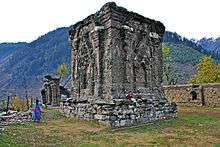Kalat Kali Temple
| Kali Temple, Kalat کالی مندر قلات | |
|---|---|
 Location within Pakistan | |
| Geography | |
| Coordinates | 29°01′49″N 66°34′48″E / 29.0304°N 66.58°ECoordinates: 29°01′49″N 66°34′48″E / 29.0304°N 66.58°E |
| Country |
Pakistan |
| Culture | |
| Sanctum | Kali |
| Architecture | |
| Architecture | Hindu temple |
| Number of temples | 1 |
| Number of monuments | 1 |
| Inscriptions | 2 |
Kali Mandir (Brahui/Urdu: کالی مندر ) is a Hindu temple located in Kalat, Pakistan in Balochistan province devoted to the Hindu deity Kali.[1]
History
Kalat has two percent Hindu population.[2] In addition, there are some Hindu Hindkowan merchants who have settled in Kalat.[3][4]
Kalat's Kali Devi temple is a Hindu mandir below citadel of the Kalat princely state, dedicated to Goddess Kali; this mandir dates back to pre-Islamic era of South Asia.
It has been known in earlier times as Kalat-i-Seva (from a legendary Hindu king) and Kalat-i Nicari which connects it with the Brahui Speaking Baloch tribe of Nicari , which is generally accepted as belonging to the oldest branch of the indigenous Brahois.[5]
The town of Kalat is said to have been founded by and named Qalat-e Sewa (Sewa's Fort), after Sewa, a legendary hero of the local Baloch.
See also
References
- ↑ Daily Times article on Varun Dev Temple
- ↑ Encyclopædia Britannica: a new survey of universal knowledge, Volume 3. Encyclopœdia Britannica. 1964. Retrieved 2008-08-17.
Almost all the people are Muslim ; the largest Hindu minorities are in the Sibi (9%) and Kalat (2%) districts.
- ↑ Viking fund publications in anthropology, Issue 43. Viking Fund. 1966. Retrieved 2008-08-17.
...is in the hands of a small caste of Hindu merchants. These Hindus are Hindko-speaking and regard Kalat as their homeland, where they generally keep their families and go for some months every year to visit and to obtain supplies. While in the Marri area, they must be under the protection of a local Marri chief or the sardar himself.
- ↑ The social organization of the Marri Baluch. Indus Publications. 1966. Retrieved 2008-08-17.
...is in the hands of a small caste of Hindu merchants. These Hindus are Hindko-speaking and regard Kalat as their homeland, where they generally keep their families and go for some months every year to visit and to obtain supplies. While in the Marri area, they must be under the protection of a local Marri chief or the sardar himself.
- ↑ E.J. Brill's first encyclopaedia of Islam, 1913-1936, Volume 4 By M. Th. Houtsma, Martijn Theodoor Houtsma Page 678

